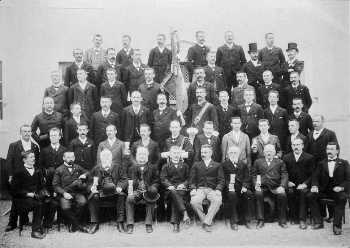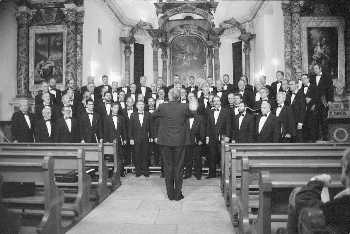150th birthday
The first one hundred and fifty years of the Chorale du Brassus
Once upon a time…
This is how our favourite childhood stories begin, those told within the family circle or among friends, those which contain the truth and the poetry of people and places, in memories, anecdotes and images.
So, once upon a time…
In fact it was in October 1951. As the train to Le Brassus ran alongside of the Lac de Joux, I opened the window impatiently. It was already dark. A fresh breeze struck my face.
There it was at last: the valley of legendary singers, the land of beautiful voices.
Nervously I made my way to the practice room for that first meeting (or rather my first test) between the singers of the CHORALE DU BRASSUS and their new director, a mere lad!
I was struck by the noble bearing of those sixty men, their attentive silence, their simple, dignified dress and their expression, like a silent question which only their singing could answer. For the first time I felt love at first sight!
Once upon a time…
This is the legend which people still believe today!
The healthy, ever-changing climate, the pure air of the wonderful Combe, the fragrance of the pastures and the pine trees (or so our friend and songwriter Jean Villard GILLES claimed!), the tranquillity of the people and the valley explain the mystery and the richness of those unmistakable deep tones!
We should be careful of these time-honoured assertions, and yet, I have often noticed that a singer coming from the plain finds so much more spirit, heart and particularly voice once he enters in the valley!
A good singing voice comes to the man who sings every day. Practice makes perfect. The earliest choral singing was in the church. Psalm and hymns imported from France and Germany flourished in this Protestant valley. The church Psalter became the family song book.
They used to sing those stirring melodies in unison every day, practising on weekday evenings, sometimes using a brass accompaniment, in order to perfect their vocal technique for the Sunday church service.
I am convinced that this patient daily practising to a large extent explains the innate sense of choral music inherited by the fortunate children-of those early singers, faithfully passed on from one generation to the next.
This constant demand for beautiful, controlled singing, was combined with the patiently acquired skills and natural love of craftsmanship, precision and artistic perfection typical of the clock-maker. Add creativity, inventiveness and the discovery of new materials to serve existing expertise, and we will understand that, at that time in history, singers, musicians and clock-makers were undoubtedly the real founders of the first choirs in the Vallée de Joux.
Once upon a time…
And it was a very long time ago, a hundred and fifty years ago, in 1849. It is not recorded in any official document (they simply do not exist) but twenty five singers from this end of the lake formed the CHORALE DU BRASSUS.
What is it that drives men, at a certain time, to meet regularly to sing hymns and patriotic songs?
The inhabitants of an isolated, self-contained place, often very cold in winter (at that time anyway) naturally join together to overcome the elements, the loneliness and the difficulties of travelling… The survival of a region is at stake.
In the villages, small groups spring up to cultivate the arts: theatre, poetry, painting, instrumental and choral music, depending on the people’s tastes.
Once upon a time…
Alphonse CAPT, a musician from Le Brassus, was the first director of the CHORALE DU BRASSUS. His successors were to bear names redolent of the valley: PIGUET, AUDEMARS, MEYLAN, CAPT… In the twentieth century, however, there have been two exceptions, MERMOUD and CHARLET, who came from the plain. Who would have imagined it?
The first male voice choirs in our country conformed to patriotic, moral, religious and even political demands.
The young academics at the time dreamed of a strong, united, free country standing proudly beside other countries. For these men, singing together was the simplest and most direct way of expressing their patriotism: Switzerland exists, let us love it and sing our respect, admiration and recognition of it. What a vision!
As a result, starting in the German part of Switzerland and spreading throughout the country, there emerged
a multitude of small and large male voice groups, which enjoyed a “golden age” lasting a hundred years.
Once upon a time…
Our beautiful valley, with its mountains and celebrated lake, the home of 6500 people was, for fifty years at least, the source of male voice choirs much envied in the canton of Vaud and even in the whole of Switzerland. There were eight of them. Today only three remain.
We must acknowledge the important role played in this dramatic historical development by two associations: the SOCIETE FEDERALE DE CHANT, formed in Aarau in 1842, and especially the SOCIETE CANTONALE DES CHANTEURS VAUDOIS which from 1853 stimulated a flourishing fashion for male voice choirs, particularly in the Vallée de Joux.
Once upon a time…
Our choir has faced the problems encountered by all such groups. Has anyone assessed the difficulties presented to male voice choirs by crises in the clock-making industry or by wars, such as the Franco-Prussian War in 1870, and the two World Wars of the twentieth century?
Every time a conflict arises, men leave their work, their families, and their choirs to put on uniform. Choirs have to cope with numbers dwindling to a level which threatens their existence.
The rapid changes in attitudes in the twentieth century brought new threats: the arrival of easily accessible entertainment through radio and television; the lure of sport, ever-present and good for you; the new habit of travel and holidays for all; increased personal wealth; the proliferation of concerts and shows; the almost daily formation of small mixed voice ensembles, often short-lived,but drawing singers away from traditional choirs; records and CDs, introducing exciting new repertoires to singers and the public. The old songs of loyalty to the fatherland have gone; the sentimental love songs have gone; the sense of loyalty to the past has gone. And all this could have announced the disappearance of the male voice choir.
But I do not think that the demands of a director and his committee scared off the real singers, the real musicians.
For a long time, the male voice choir in our country has suffered worryingly hard times, but it is making a steady comeback from its over-long absence from the concert stage and the church. We are delighted about this and the CHORALE DU BRASSUS, which has shared the problems faced by all male voice choirs, wishes to share the joy of the newly formed choirs, to help and support their admirable achievements.
Experience has taught us that for a male voice choir to survive and keep on course, we must always remember that the choir is a wonderful shared dream, in which all the singers are happy and proud to belong to an excellent group, which is united, friendly and welcoming. The members of the choir need this support, this challenge and the mutual understanding which also binds the director to his chairman and the committee. The director of the choir needs energy, imagination, a lot of humility towards music and musicians. It is his responsibility to select music of the highest quality, suited to the singers; music which enriches them and reveals the hidden beauties of the male voice repertoire. These are some of the ideals which I dream, to which I aspire, like all of you…
André Charlet


